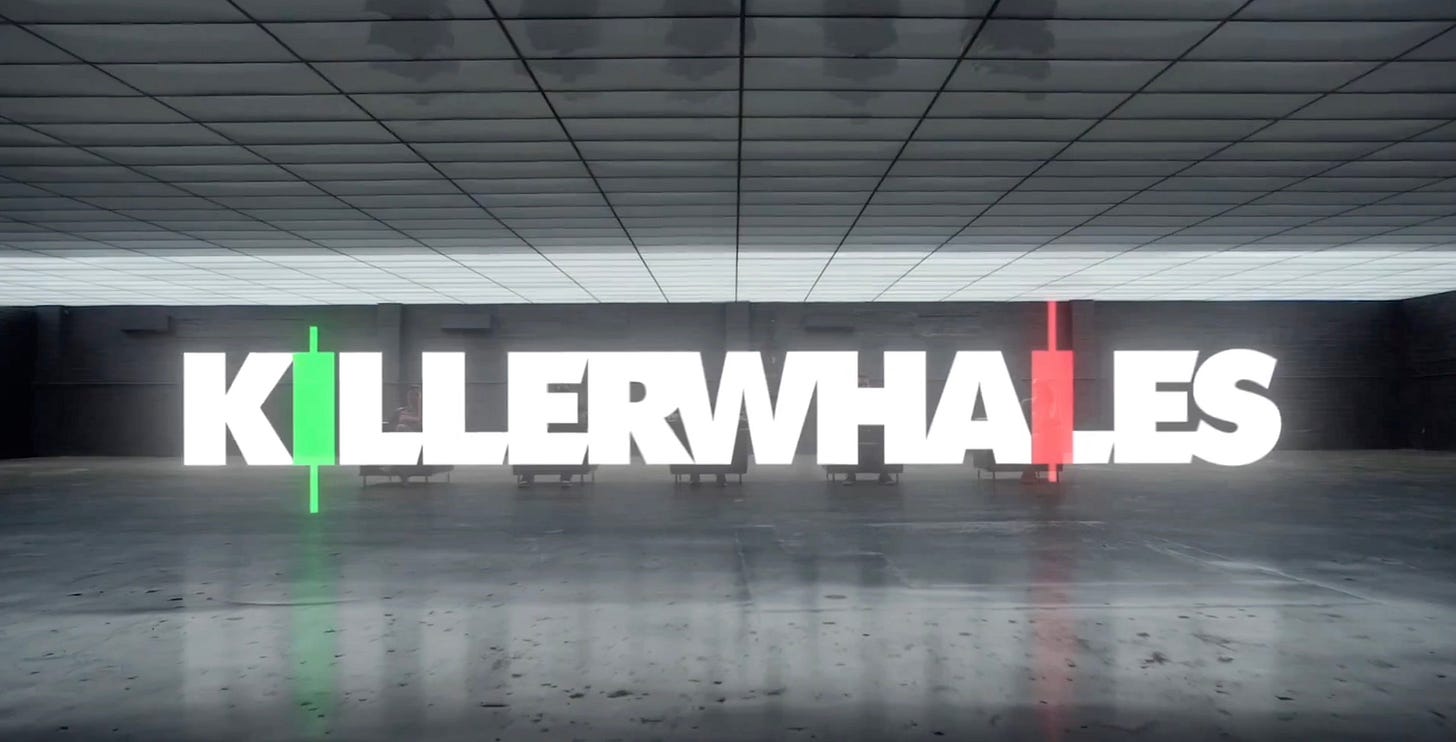Killer Whales, the Shark Tank of web3, is everything that's wrong with crypto
I watched two seasons of this mess so you don’t have to.
The second season of Killer Whales, a crypto-themed Shark Tank knock-off, debuted a few weeks ago. Few people noticed.
Set in what looks like an abandoned garage, the concept follows shows like Shark Tank or Dragon’s Den, with five supposed crypto titans (but mostly influencers) sitting in judgment as startup founders pitch their blockchain dreams. The judges, or “whales”, then choose to “sink” or “swim” a project. Those with a majority of “swim votes” — three out of five — are considered to have passed.
It’s not really clear what the prize is. It’s always carefully phrased as “$1.5 million in prizes”, without explaining what they are, only that it includes some sort of “accelerator package from the legendary CoinMarketCap”. Yay.
The whales’ intros are equally absurd. Crypto Banter and Onchain Capital CEO Ran Neu-Ner’s intro details that he “lost over a hundred million in a day during the infamous 2022 crypto collapse”, before we are told that even if we don’t like influencer Mario Nawful, we need to “respect his grind” (we don’t). It’s almost as bad as crypto influencer Wendy O’s season one intro, which was “I’m a woman”, with no reference to what she actually does or who she is.
Somewhere amongst this befuddled jargon-laced word salad is the makings of a very lethal drinking game. Shots should be handed out for mentions of “onboarding the next billion people”, “interoperability”, “the community”, “power to the people”, “governance model” and every other trite, meaningless crypto slogan that issues forth from the mouths of both the judges and judged.
Get the weekly newsletter delivered fresh and ironed to your email each week, with the latest news on scams, fraud and tech, as well as Scamurai’s latest investigations — all in one place! Every Friday morning at 8am GMT.
But the most bizarre thing about it is that, on occasion, the whales do ask the right questions and contestants flounder. There are awkward moments when people are forced to admit their projects have few users, no utility and that the people presenting the pitch have no ability to grasp basic financials. What is weird about this though is that the whales hear all this and “swim” the projects anyway.
Perhaps it’s because there’s no money on the table.
First up on episode one is Robert Bryan’s Karate Combat. I’ve seen it as a side event at a few crypto conferences, and actually the fights are quite fun to watch. But, as it has to make itself a crypto company rather than be a mere, old-fashioned events company, Karate Combat also has an app where you can bet on the outcomes.
This includes a novel way of gambling in which you don’t lose any money. “ If [a users’] fighter is victorious, they earn additional tokens. If the fighter loses, they don’t lose anything,” Bryan explains.
Somehow, this fact doesn’t attract much interest from the whales.
“ What’s more is the token actually governs a league,” Bryan continues. “Token holders determine fighting prospects, the rule set and a number of other critical decisions. This governance model provides transparency and community involvement.”
Shots! Shots for everyone!
Bitget CEO Gracy Chen then points out the flaw. “Your dex trading volume within the past 24 hours is only barely 4,000 USD, with only 150 onchain transactions in the last week,” she says.
But Illa Da Producer, community and partnerships lead at Yuga Labs — a company no better than this show’s worst contestants — has Bryan’s back.
“The thing that really saves you in my eyes is that you’re actually getting rid of the middleman in combat sports. ‘Cause I think fighters really get the raw end of the deal and your token is an actual governance token,” he points out.
This is a common refrain from season one that reappears in the new season as well, and one that is absolute nonsense. Crypto projects aren’t cutting out the middleman. They are trying to replace them — a fact nobody in crypto has been able to grasp for years. You are not a community or a governance model. At best, you are a business dressed up as a movement trying to replace other businesses. At worst, you are a Ponzi.
Mario Nawful adds that he likes Karate Combat but he’s worried Bryan is “gonna screw it up with a token”, a concern applicable to every crypto project in existence.
Bryan and Karate Combat get sunk. But, as subsequent pitches will prove, he is among the sanest of them.
He’s followed by a man who steps out of a branded Cybertruck wearing shoes without socks, which upset me greatly and proved quite a distraction during his pitch. Jake Gagain is a community member for the memcoin Brett. He opens with a quote from Elon Musk, lauds memecoins as the future and then launches into a pitch about how memecoins essentially bring meaning and purpose to the chronically online and cripplingly lonely.
“Memecoins give people a sense of belonging to a community, and they’re changing the guard in the crypto space by giving the power back to the people,” he gushes.
Shots!
He delivers his power to the people spiel but won’t admit how much Brett he holds, saying “that’s a private question”. The creators of Brett remain a mystery, which whale Neu-Ner says is actually “better” than if they were known.
The whales question Gagain and establish the memecoin is a pump and dump, with financier Anthony Scaramucci branding the project “bullshit”.
“ It’s as if the Hale-Bopp comet got married to the submarine that exploded on the way down to the Titanic,” he says.
Then all of the whales except Scaramucci give the project a “swim”.
Scaramucci seems annoyed at his fellow whales and tells them they are out of their minds. “These things are going to zero, and you’re gonna be sitting here regretting that you had the green lights flashing in here,” he says.
The next episodes don’t go much better. Though none hit the fantastic lows of the last season, including the Bored Ape Yacht Club-inspired ApeWater and its mission to “reimagine water”, the trend of dire mumbo jumbo continues unabated.
The bloodied carcass of web3 gaming is taken out for another beating in the form of WAGMI Games. The founders ask the whales “who’s ready to get wet?”, which leads to an awkward exchange later on when Gracy Chen says she wants to get wet but is still super dry.
We meet the “Google of web3” and the “Netflix of crypto gaming”. In episode three, the whales back a project called Carv that wants to give people the power to control their own data by helping them sell it — for a 90% cut.
Then there’s a project that wants to stick tags in your designer clothes so you can track them and check they’re genuine, on the off-chance you weren’t sure that the twenty quid Chanel dress you bought on Vinted was indeed a fake.
A smattering of janky-looking augmented reality apps offer you the chance to spend more time staring at the world through your phone screen, web3 gaming firms reduce characters, stories and world building — things people love — to vaguely newspeak-sounding “IP”, and whales repeatedly make decisions based on a person’s vibe rather than their business actually being a feasible business.
The ads in between the pitches are just as head-scratching. Chief among them, WEEX is a prominent sponsor in most episodes. It describes itself as “one of the most trusted crypto exchanges”, but has received multiple cease and desist warnings from places like Arkansas, Georgia and Ontario for operating without a license.
It might or might not be Taiwanese — I can’t tell — but its Trustpilot entry says Singapore (it’s not licensed there either). British footballer Michael Owen is a brand ambassador, sports sponsorships in crypto never being a good sign. Its CEO, according to its website, is a mohawked CryptoPunk called Peter.
All in all, the show should probably be required watching for anyone interested in the crypto industry. Not because it’s good. It’s terrible. But it does show just how stupid crypto really is.
Get the weekly news roundup straight to your inbox every week by subscribing. Or consider supporting Scamurai with a paid subscription.
Tips, vitriol and all other messages should be directed to Callan Quinn at callan@scamurai.io.





